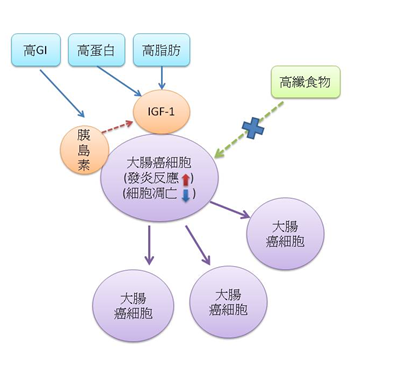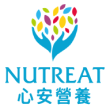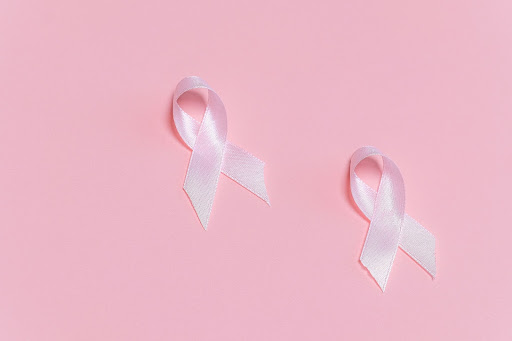近年來對於攝取碳水化合物與大腸直腸癌兩者之間關係的長期研究越來越多,研究主要以飲食頻率調查方法,追蹤被訪問者的飲食與健康狀況至少5年以上。
2004年美國學者發表,在1993年進行的女性健康研究,38,145位大於45歲女性經過7.9年的追蹤,其中有174位罹患大腸癌,結果統計出與大腸癌的相對危險性註1分別為:
升糖指數1.71
糖份1.51
果糖2.09
碳水化合物2.41
升糖負荷2.85(15)
在2006年美國研究自1986至2000年對47,422位介於45-75歲男性進行追蹤,其中有696位罹患大腸癌患者,結果統計出與大腸癌的相對危險性分別為:
升糖指數1.14
碳水化合物1.27
糖分1.3
升糖負荷1.32
果糖1.37(16)
以上研究皆可以推論,高升糖指數、高升糖負荷、碳水化合物、蔗糖以及果糖的攝取量對於大腸癌在統計上兩者間皆有顯著正向關聯。但是,這些研究中並不一定都有排除目前已被證實對大腸癌病因形成有關的食物因素與不良的生活型態,例如:抽煙、喝酒、飽和脂肪酸,活動量低的日常生活型態等。
2012年英國學者將上段文章提及在內的共13篇研究文獻報告(13-25),重新調整了熱量、紅肉、葉酸、纖維攝取量、脂肪、酒精的攝取量、抽煙、年齡、身體質量指數、30歲前的體能運動、受訪者目前的體能運動且排除了對大腸癌形成病因相關的飲食因素,分析結果顯示升糖指數、升糖負荷、碳水化合物、蔗糖以及果糖的攝取量對於大腸癌在統計上兩者間卻皆無顯著的關係。
從此結果可推測高升糖指數與高升糖負荷的食物像是水果類、全榖根莖類等含有大量的纖維(27),已被證實為可預防與減緩大腸直腸癌的發生與進展。而低升糖指數與低升糖負荷的食物包含蛋白質、脂肪等食物其實也會刺激胰島素的分泌,增加類胰島素生長因子濃度。所以如果只以食物的升糖指數以及食物的碳水化合物攝取方面來探討血糖是否會影響大腸癌的發生,尚需更研究來證實。
註1:相對危險性:數值越大表示兩著間有越強的相關性。

經過一系列的文章介紹,不知道你對於血糖與大腸癌之間的關係是否有更深入的了解了呢?
其實,無論是一般健康人或是糖尿病患者、大腸癌患者,我們都必須謹記均衡飲食的重要性,平時選擇食物需要降低飽和脂肪與紅肉攝取,在食物的選擇應偏向天然未經加工食物;而高升糖指數的食物應降低單次攝取量以避免胰島素分泌過量,過量的胰島素對人體是有負面影響,包含糖尿病、心血管疾病、腫瘤細胞增生等等。除了飲食之外,戒除不良的生活習慣也是維持健康的首要條件,例如:抽煙、酗酒、不正常作息,以及隨時保持愉快心情,以上方法都有助於控制病情。
參考文獻
13. Bostick RM, Potter JD, Kushi LH et al Sugar, meat, and fat intake, and non-dietary risk factors for colon cancer incidence in Iowa women (United States). Cancer Causes Control 1994;5:38–52.
14. Terry PD, Jain M, Miller AB, Howe GR, Rohan TE. Glycemic load, carbohydrate intake, and risk of colorectal cancer in women: a prospective cohort study. J Natl Cancer Inst 2003;95:914–916.
15. Higginbotham S, Zhang ZF, Lee IM et al.Dietary glycemic load and risk of colorectal cancer in the Women’s Health Study. J Natl Cancer Inst 2004;96:229–233.
16. Michaud DS, Fuchs CS, Liu S, Willett WC, Colditz GA, GiovannucciE. Dietary glycemic load, carbohydrate, sugar, and colorectal cancer risk in men and women. Cancer Epidemiol Biomarkers Prev 2005;14:138–147.
17. McCarl M, Harnack L, Limburg PJ, Anderson KE, Folsom AR. Incidence of colorectal cancer in relation to glycemic index and load in a cohort of women. Cancer Epidemiol Biomarkers Prev 2006;15:892–896.
18. Larsson SC, Giovannucci E, Wolk A. Dietary carbohydrate, glycemic index, and glycemic load in relation to risk of colorectal cancer in women. Am J Epidemiol 2007;165:256–261.
19. Strayer L, Jacobs DR Jr, Schairer C, Schatzkin A, Flood A. Dietary carbohydrate, glycemic index, and glycemic load and the risk of colorectal cancer in the BCDDP cohort. Cancer Causes Control 2007;18:853–863.
20. Weijenberg MP, Mullie PF, Brants HA, Heinen MM, Goldbohm RA, van den Brandt PA. Dietary glycemic load, glycemic index and colorectal cancer risk: results from the Netherlands Cohort Study. Int J Cancer 2008;122:620–629.
21. Kabat GC, Shikany JM, Beresford SA et al. Dietary carbohydrate, glycemic index, and glycemic load in relation to colorectal cancer risk in the Women’s Health Initiative. Cancer Causes Control 2008;19:1291–1298.
22. Howarth NC, Murphy SP, Wilkens LR, Henderson BE, Kolonel LN. The association of glycemic load and carbohydrate intake with colorectal cancer risk in the Multiethnic Cohort Study. Am J Clin Nutr 2008;88:1074–1082.
23. George SM, Mayne ST, Leitzmann MF et al. Dietary glycemic index, glycemic load, and risk of cancer: a prospectivecohort study. Am J Epidemiol 2009;169:462–472.
24. Li HL, Yang G, Shu XO et al. Dietary glycemic load and risk of colorectal cancer in Chinese women. Am J Clin Nutr 2011;93:101-107.
25. Tasevska N, Jiao L, Cross AJ et al. Sugars in diet and risk of cancer in the NIH-AARP Diet and Health Study. Int J Cancer 2012;130:159–169.
26. Aune et al. Carbohydrates, glycemic index, glycemic load, and colorectal
cancer risk: a systematic review and meta-analysis of cohort studies. Cancer Causes Control 2012;23:521–535.
作者:李慧庭營養師
整理編輯:心安營養團隊












